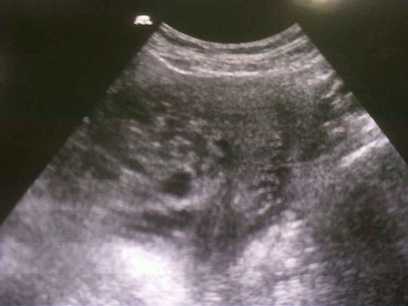Resumo
Definição
História e exame físico
Principais fatores diagnósticos
- presença de fatores de risco
- primeiro trimestre da gestação
- sangramento vaginal
- tamanho uterino incomum para a idade gestacional
Outros fatores diagnósticos
- pré-eclâmpsia de início precoce
- dispneia e desconforto respiratório
- náuseas e vômitos intensos
- taquicardia, tremor, insônia e diarreia
- palidez
- dor pélvica
- sangramento uterino
Fatores de risco
- extremidades etárias maternas
- gravidez molar prévia
- gordura e caroteno reduzidos na dieta
Investigações diagnósticas
Primeiras investigações a serem solicitadas
- exame histológico do tecido placentário
- gonadotrofina coriônica humana (hCG) sérica
- ultrassonografia pélvica
Investigações a serem consideradas
- Hemograma completo
- tempo de protrombina (TP), tempo de tromboplastina parcial (TTP) séricos
- perfil metabólico sérico
- hormônio estimulante da tireoide (TSH) sérico
- tipagem sanguínea com rastreamento de anticorpos
- radiografia torácica
Algoritmo de tratamento
gravidez molar única: pacientes que desejam manter a fertilidade
gravidez molar única: pacientes que não desejam manter a fertilidade
feto gêmeo viável: interrupção eletiva não desejada
feto gêmeo viável: interrupção eletiva
após o manejo inicial: alto risco de neoplasia trofoblástica gestacional com conclusão do acompanhamento improvável
Colaboradores
Autores
Antonio Braga, MD
Associate Professor
Department of Obstetrics and Gynecology
Rio de Janeiro Federal University
Department of Maternal Child
Fluminense Federal University
Rio de Janeiro
Brazil
Declarações
AB is an author of references cited in this topic.
Kevin M. Elias, MD
Assistant Professor
Brigham and Women’s Hospital
Dana Farber Cancer Institute
New England Trophoblastic Disease Center
Division of Gynecologic Oncology
Department of Obstetrics, Gynecology and Reproductive Biology
Harvard Medical School
Boston
MA
Declarações
KME has been a paid consultant for AOA Dx and received research support from Aspira Women’s Health and Abcam, Inc. KME is an author of references cited in this topic.
Neil S. Horowitz, MD
Associate Professor
Brigham and Women’s Hospital
Dana Farber Cancer Institute
New England Trophoblastic Disease Center
Division of Gynecologic Oncology
Department of Obstetrics, Gynecology and Reproductive Biology
Harvard Medical School
Boston
MA
Declarações
NSH is an author of references cited in this topic.
Ross S. Berkowitz, MD
William H. Baker Professor of Gynecology
Brigham and Women’s Hospital
Dana Farber Cancer Institute
New England Trophoblastic Disease Center
Division of Gynecologic Oncology
Department of Obstetrics, Gynecology and Reproductive Biology
Harvard Medical School
Boston
MA
Declarações
RSB is an author of references cited in this topic.
Agradecimentos
Dr Ross S. Berkowitz, Dr Kevin M. Elias, Dr Neil S. Horowitz, and Dr Antonio Braga would like to gratefully acknowledge Dr John Soper and Dr Emma Rossi, previous contributors to this topic. JS and ER declare that they have no competing interests.
Revisores
Jane Stewart, PhD, MSc
Consultant Gynecologist
Subspecialist in Reproductive Medicine
Newcastle Fertility Centre at Life
Bioscience Centre
International Centre at Life
Newcastle upon Tyne
UK
Declarações
JS declares that she has no competing interests.
Philip Savage, PhD, FRCP
Consultant in Medical Oncology
Department of Medical Oncology
Charing Cross Hospital
London
UK
Declarações
PS declares that he has no competing interests.
Aparna Sundaram, DO, MBA, MPH
Physician Consultant
Preventive Medicine
Private Practice
Atlanta
GA
Declarações
AS declares that she has no competing interests.
Créditos aos pareceristas
Os tópicos do BMJ Best Practice são constantemente atualizados, seguindo os desenvolvimentos das evidências e das diretrizes. Os pareceristas aqui listados revisaram o conteúdo pelo menos uma vez durante a história do tópico.
Declarações
As afiliações e declarações dos pareceristas referem--se ao momento da revisão.
Referências
Principais artigos
Horowitz NS, Eskander RN, Adelman MR, et al. Epidemiology, diagnosis, and treatment of gestational trophoblastic disease: A Society of Gynecologic Oncology evidenced-based review and recommendation. Gynecol Oncol. 2021 Dec;163(3):605-13.Texto completo Resumo
Ngan HYS, Seckl MJ, Berkowitz RS, et al. Diagnosis and management of gestational trophoblastic disease: 2021 update. Int J Gynaecol Obstet. 2021 Oct;155 Suppl 1(suppl 1):86-93.Texto completo Resumo
Tidy, J, Seckl, M, Hancock, BW, on behalf of the Royal College of Obstetricians and Gynaecologists. Management of gestational trophoblastic disease. BJOG 2021;128: e1-e27.Texto completo
Lok C, van Trommel N, Massuger L, et al. Practical clinical guidelines of the EOTTD for treatment and referral of gestational trophoblastic disease. Eur J Cancer. 2020 May;130:228-40. Resumo
Artigos de referência
Uma lista completa das fontes referenciadas neste tópico está disponível para os usuários com acesso total ao BMJ Best Practice.

Diagnósticos diferenciais
- Hiperêmese gravídica
- Aborto espontâneo
- Gestação múltipla
Mais Diagnósticos diferenciaisDiretrizes
- Diagnosis and treatment of gestational trophoblastic disease
- Epidemiology, diagnosis, and treatment of gestational trophoblastic disease
Mais DiretrizesConectar-se ou assinar para acessar todo o BMJ Best Practice
O uso deste conteúdo está sujeito ao nosso aviso legal